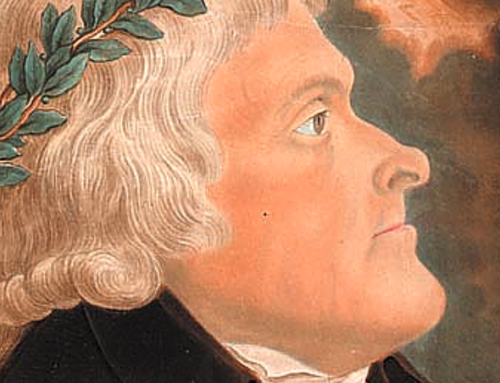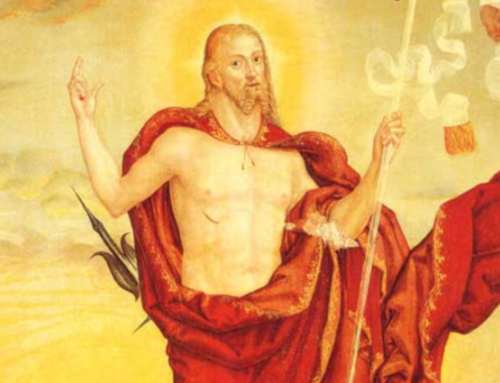My close friend and colleague, Mickey Craig, chair of the Department of Political Science at Hillsdale, has given me a couple of pointers as well as sources to consider regarding Russell Kirk’s relationship to Leo Strauss’s students. As frequent The Imaginative Conservative readers know, we’ve had a discussion—but only, thus far, a brief one—regarding the relationship of Russell Kirk to Leo Strauss, as well as Kirk’s relationship to the students of Strauss.
Last night, I happily found that Mickey had left in my office mailbox a 102-page paper Harry Jaffa had written, “The Decline and Fall of the American Idea: Reflections on the Failure of American Conservatism,” in 1996. I’ve yet to read it all, but I’m very thankful to Mickey for passing this on to me. And, I’m eager to read Jaffa’s argument.
Mickey also suggested this online piece by Charles Kesler (part of which I quoted from a different source in a previous post):
Here’s Kirk on Strauss’s students in his shamefully underrated 1990 book, The Conservative Constitution (pg. 65):
More recently—that is, chiefly since the 1950s—Locke has been apotheosized by disciples of Leo Strauss, an amiable and learned professor of politics, strongly influenced by Greek philosophy. Less learned and less amiable than their master, many of the latter-day Straussites demand ideological conformity to a “Lockian interpretation” of the Constitution and of American history and politics generally. That interpretation, though sometimes called “conservative” (as indeed Professor Strauss was personally), is bound up with secularistic and egalitarian assumptions. This adulation of Locke (or rather of a fancied Locke who did not exist), erected into a dogma, is the more curious in view of Strauss’s chapter “Modern Natural Right” in his book Natural Right and History, in which Strauss argues that Locke was powerfully influenced by the thought of Thomas Hobbes—that ‘presumptuous little upstart” (T.S. Eliot’s phrase) whom Strauss did not love. But consistency is a jewel. In the 1950s and 1960s, though, Kirk had nothing but praise for Leo Strauss as a person and as a scholar, in both his published works and in his private letters. Kirk also seems to have been taken with Strauss’s students.
This week, while researching at the Russell Kirk Center for Cultural Renewal in Mecosta, Michigan, I came across the following To the Point column from the spring of 1963. I give you it in its entirety:
J.M. Keynes wrote that the lectures in today’s classroom become the slogans of the crowd in the street some years afterward. So professors exert a power which seldom is acknowledged by the politicians of their hour, but which works for years, or generations, or even centuries to come.
It is difficult to exaggerate, for instance, the influence which the late Harold Laski had upon the course of Britain—and the dissolution of the British Empire—through his teaching at the London School of Economics. At that institution, by the way, Laski’s old chair now is occupied by Professor Michael Oakeshott, also a man of great though subtle influence, whose conservative views are diametrically opposed to those held by Laski. In America, the counterpart of Mr. Oakeshott, in certain ways, is Professor Leo Strauss, of the department of political science at the University of Chicago. Dr. Strauss is a learned and determined advocate of “the great tradition” in political thought, from Plato through Cicero and the Schoolmen to our time. His students, increasingly established an academic posts throughout the country, swear by him.
In person, Mr. Strauss—an exile from Germany during the Nazi years, who first taught in this country at the New School for Social Research–is tiny and diffident. When first I called upon him, he murmured in relief, “Oh, Mr. Kirk! I’m so happy to find that you’re little, too! From your books, I had feared that you might be a great, tall, fierce man.”
At the University of Detroit, a few weeks ago, Prof. Strauss led a two–day public session on “The Predicament of Modern Politics.” The other participants, except for this writer, were former students of Strauss’s, some of whom consider themselves liberals, and others conservatives: but all of them abide by the first principles of order, justice, and freedom which Prof. Strauss annunciates so lucidly.
This retiring scholar, in his soft voice, held a general audience to close attention. He is the arch–critic of the dominant “behavioralistic” school of political science in the United States: a situation which requires considerable courage. These powerful opponents, in recent months, have grown increasingly strident and vituperative in their assaults upon him—which suggests that he is making headway and so getting under their skins. Certainly it is most difficult to reply logically to Mr. Strauss says temperate reason.
Among the indices to soundness or error in modern practical politics, Mr. Strauss remarked to me, are these issues: does one prefer income taxes, or excise taxes? Does one approve of, or attest, Mr. J Edgar Hoover? Does one stand for private medical practice, or state medicine? Prof. Strauss is on the side of excises, Hoover, free (that is, private) medicine—and the angels. [All of the above comes from Russell Kirk, “The Power of a Professor,” To The Point (General Features Corporation, May 8, 1963).]
These quotes—from 1990 and 1963, respectively—nuance the relationship between the two men to a large degree.
In an essay on the Kesler piece, Stephen Masty said that Kirk considered Strauss to have become a kind of “Beatles’ guru.” Considering that Strauss died only 10 years after Kirk wrote the first praising piece, quoted in full above, Kirk must (Steve, correct me if I’m wrong) have been thinking much more of the students than of Strauss himself.
Strauss is almost entirely absent from Kirk’s autobiography—another oddity considering their strong relationship in the 1950s and 1960s—mentioned only twice, the first time only in passing.
The second mention, though, is perhaps more revealing. Kirk:
particularly emphasized in his study the neglected influence of Edmund Burke on the framers and the interpreters of the Constitution. The Conservative Constitution undid the claim of the disciples of Leo Strauss that somehow the Declaration of Independence and the Constitution had conformed slavishly to the doctrines of John Locke. [Sword of Imagination, 464]
Certainly, all of this warrants a great deal of study, almost all of which still needs to be done. If Strauss truly was on the side of the angels, he and Kirk are probably enjoying a beer, a smoke, and a good conversation right now.
[Mickey Craig, by the way, is also on the side of the angels. We’ve explored everything from Savannah grave yards to the memorial of Pearl Harbor on a variety of trips. He is also a close enough friend to tell me when I’m wrong about something—his honesty and frankness are nourishing and refreshingly bright lights in this valley of shadows. But, I digress. . . .]
Books on the topic of this essay may be found in The Imaginative Conservative Bookstore. The Imaginative Conservative applies the principle of appreciation to the discussion of culture and politics—we approach dialogue with magnanimity rather than with mere civility. Will you help us remain a refreshing oasis in the increasingly contentious arena of modern discourse? Please consider donating now.








This extended version of Charles Kesler's thoughts on conservatism (a lot of good stuff there, by the way) makes it even clearer that he does not walk the same ground that Russell walked. He certainly would not disagree with this. But the Straussian preoccupation with politics, I believe, leads them to interpret the American separation from the Brits, and almost everything else about American life, from an ideological commitment to a few documents and a couple of what Kirk indeed understood as abstractions. To dismiss Kirk because he did not believe that the American "Revolution" was not summed up in the Declaration, or that he did not believe that "equality" was its essence, is simply to refuse to take the traditionalist argument seriously–or to admit that indeed, there is an argument. To each his own, but all in all, I'd rather be in Philadelphia than Washington, to borrow from a funny guy and twist his meaning.
Brad, thanks for posting two primary sources that are most illuminating. I hope your research in Mecosta uncovers more about the relationship between Russell Kirk and Leo Strauss, and how they responded to each other's ideas. We'll stay tuned.